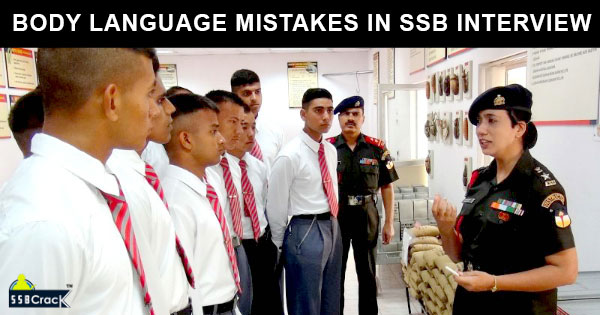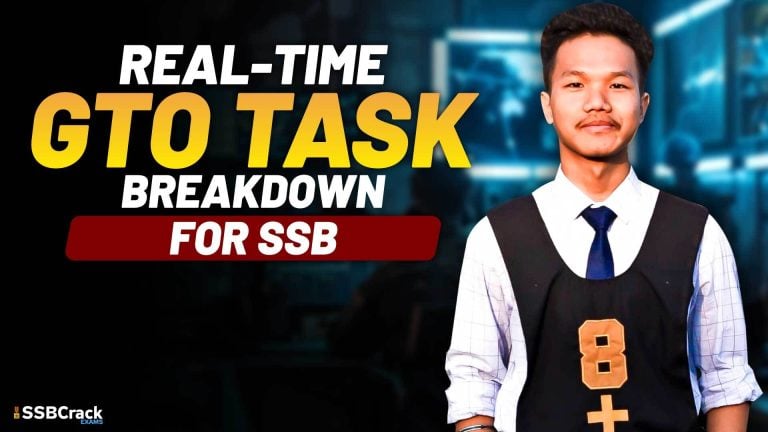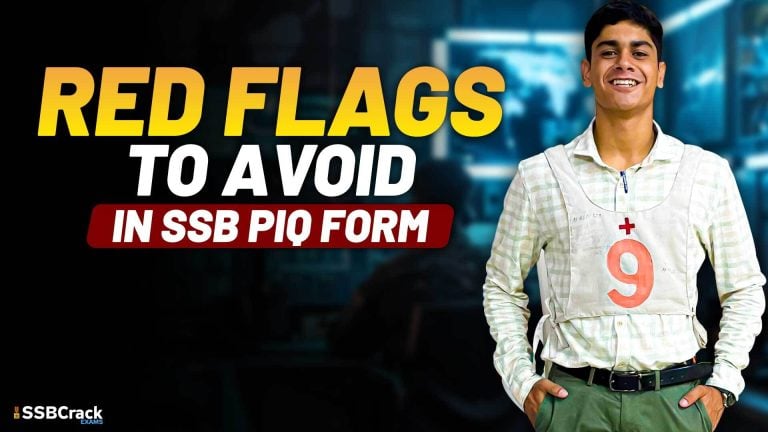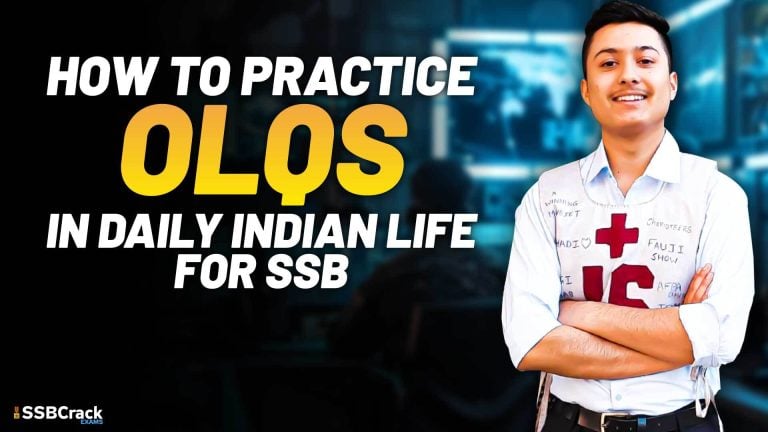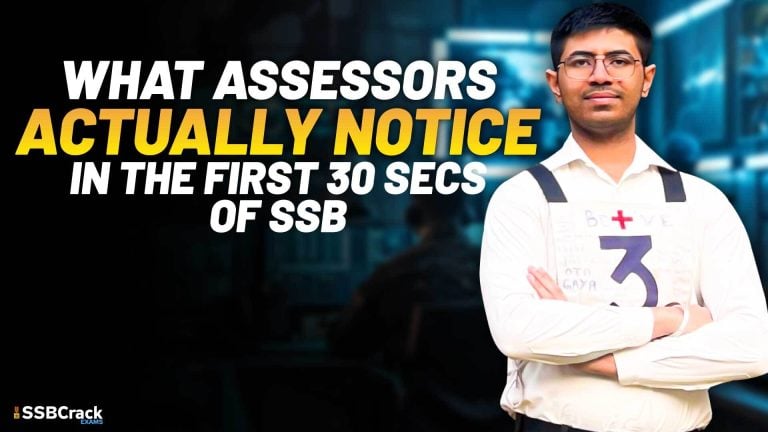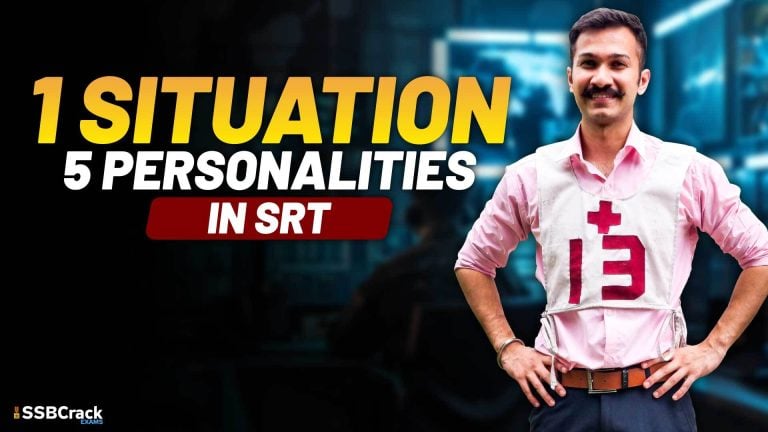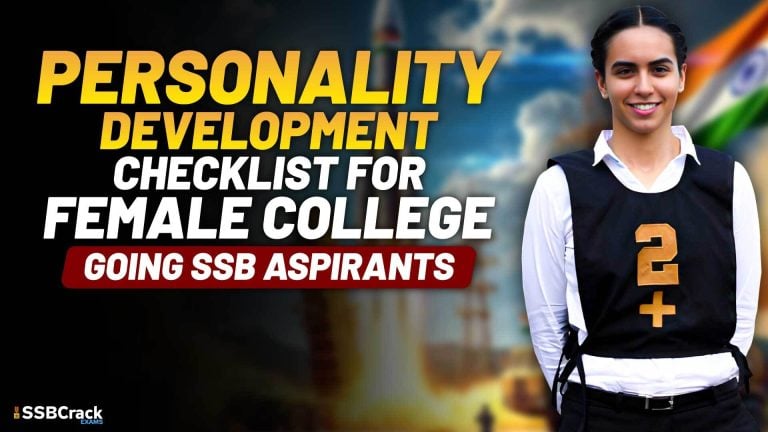The majority of our communication comes from body language. While it’s important for you to be communicative in the SSB Interview, it is also very important to have a proper body language. Improper or incorrect body language can send the wrong message to the interviewer. So, here’s how you should avoid sending the wrong message and ditch the 10 most common body language mistakes if you want to put your best foot forward in the SSB Interview.
Download: SSB Interview eBook Pack
Tip 1 : Poor Posture
Slumping in your seat doesn’t convey confidence. Studies have shown that individuals who sit up straighter are more likely to view themselves as having strong leadership skills, whereas those with hunched postures have higher risks of feeling easily stressed. Sitting up straight and squaring your shoulders not only makes you look confident, but it also shows you respect your interviewer and the situation you’re in. Sit as if there’s a string tied from the top of your head to the ceiling. This trick also helps if you have a tendency to lean back in the chair, which could be viewed as not taking the conversation seriously. Sit straight, but not so straight it looks like you’re craning your neck to the ceiling. It may seem like you are being stiff and prudish. Similarly, watch your posture when standing. Push your shoulders back, keep your chin up, and stand with your feet slightly apart. No matter what branch of the military you observe, one thing stands out: their shoulders say look at me, I am a leader; follow me. This is part of establishing hierarchy, but it is also how we demonstrate respect.
Tip 2 : Avoiding Eye Contact
Eye contact is super-important when you’re being interviewed. People who avoid eye contact or have shifty eye movements come across as suspicious or even creepy. Distracted or upward eye movements can suggest someone is lying or not sure of themselves. It’s important to look someone directly in the eye to convey confidence and certainty. Looking down as you talk may seem like you lack confidence or are self-conscious causing your words to lose their effect. Avoid glancing at the clock, which implies disinterest and can be interpreted as disrespectful. Eye contact is important to convey a sense of confidence and ability but holding contact for long periods without breaking will hurt you too. Prolonged, forceful eye contact can be interpreted as aggressive. Break eye contact every seven to 10 seconds. The way we break eye contact also sends a message. Glancing down communicates submission, while looking to the side-projects confidence. If there’s more than one person in the room, make eye contact with each person. And don’t stare at the mouth or forehead.
Tip 3 : Being Too Serious & Not Smiling
Not only does smiling make you seem warm and friendly, but it might even calm your interview jitters. While frowning and scowling can signal displeasure or judgment, smiling can invoke positive feelings from the interviewer and help create a good lasting impression. Smiling tells an interviewer so many things about you, but when we’re nervous, we naturally stop smiling. Practice answering interview questions while reminding yourself to smile. If you don’t smile sometimes during the SSB interview, it may wrongfully tell the interviewer that you’re not a positive person or you’re just not excited about the whole thing. But that doesn’t mean you have to smile always. That may again express your lack of taking things seriously and can land you in trouble. Smiling at the beginning and end of your interview — but not as much in between — will make you seem more approachable and likable. It’s all about balance. Do what feels natural and don’t overthink it. A simple trick is to try and match the energy or demeanor of your interviewer.
Tip 4 : Touching your Face, Nose or Mouth
Playing with your hair or touching your face is an interview no-no. The first makes you look childish and stressed. The latter conveys something even worse. Face touching, especially on the nose, is commonly interpreted as an indication of deception or lying. If you’ve got long hair, tie it back neatly so you can’t toy with the ends. And, make a conscious effort not to touch your face for entire time you’re there. Don’t bite your nails or scratch your head to show your childish nervousness and lack of self control.
Tip 5 : Defensive or Aggressive Body Posture
Avoid crossing your arms across your chest, leaning forward a bit too assertively or invading the interviewer’s personal space (aside from a handshake). All these body languages show that you are closed off, defensive, narrow-minded, hostile or just plain bored. The last thing you want in an interview is to indicate that you’re one to constantly question or challenge everything, at every turn. Turn off the aggressive body language cues and, instead, rest your hands in your lap, on the arms of the chair, or anywhere that conveys a sense of calmness and an even-tempered disposition. Keep your hands relaxed, open, and visible. Clenching your fists makes you seem closed off and defensive. Also, it can make you argumentative, as you will appear ready to spring into action at any moment.
Tip 6 : Excessive Hand Gestures
You may be super-excited about your performance in the SSB Interview, but wild gesticulations with your hands or arms can seem, well, just a wee bit whacky. Even though you’re enthusiastic, this can still be seen as a body language mistake. Settle down and study up on when and how to employ your hands during an interview. Used sparingly and with precision, hand gestures can be a powerful way to make a point. Too much finger pointing or air chopping makes you seem strident, not decisive. Enthusiastically sweeping your arms or using intense pointing gestures can be unsettling because it comes across as chaotic and hectic, which aren’t qualities interviewers look for in a defence aspirant. Wild gestures can also be seen as overcompensation for a speaker that is stretching the truth. Make small, simple gestures to convey openness and honesty, which will inspire confidence and make you seem smarter.
Tip 7 : Fidgeting
Too much fidgeting will make you look anxious and nervous, which might cause your interviewer to question your assertiveness and interpersonal warmth. Avoid the temptation to fidget your fingers. By embracing stillness, you can display the persona of a confident and capable leader. If you have a hard time doing this, practice answering questions while keeping as still as possible in front of a mirror. too much shifting in your seat or foot tapping is a big interview mistake. Don’t wobble or jiggle your feet. It’s annoying and distracting. Place both feet firmly on the floor then channel your nervous energy into thinking hard about answering the interviewer’s questions with all the knowledge you’ve prepared. Unfortunately, you might get fidgety during the SSB interview and not even realize it. Try doing a mock interview with a friend so they can let you know about any nervous gestures you might be making.
Tip 8 : Shrugging
Shrugging isn’t a good look for any interviewee in the SSB Interview, since it means that you might be indifferent or unhappy with what your interviewer is saying. But shrugging just one shoulder can also indicate that you’re lying, so be careful not to shrug—at all.
Tip 9 : Fiddling with Objects
An interviewer who witnesses you playing with your jewelry, picking at your fingernails, or twirling your hair may assume you’re bored or impatient. Luckily, this is a body language mistake with an easy remedy. Simply eliminate the source, whether that means leaving bracelets at home or pulling back hair. Another trick is to press the fingertips of your hands together to form a church steeple. You’ll display confidence while keeping your nervous digits under control.
Tip 10 : Nodding Too much
People often believe that nodding in agreement at everything the interviewer says will work in their favour. That’s not actually the case. While it’s all well and good to nod in agreement when you do genuinely agree with something, you need to avoid the “nodding dog syndrome.” Nodding in agreement with everything, regardless of the message, makes you look somewhat sycophantic, perhaps even spineless. Even worse, if you’re not paying attention and then get asked a question related to the issue you were nodding about, you could look like a fool. Keep the nodding under control, as well as shaking your head in disagreement.
Try to avoid the above-mentioned body language mistakes in the SSB Interview and you will surely achieve success and create a good impression on your interviewers. Remember, to handshake holding the hand/hands of your interviewer/s in a firm grip (please make sure you don’t do it so strongly as to crush their hands!), only when a handshake is offered to you. Do not initiate it on your own. Follow the interview etiquette and practice well in advance with your friends or family members. And don’t forget to relax and destress yourself. Believe in yourself and be confident of yourself.
Jai Hind!
